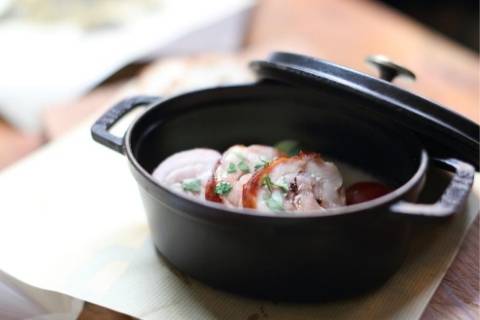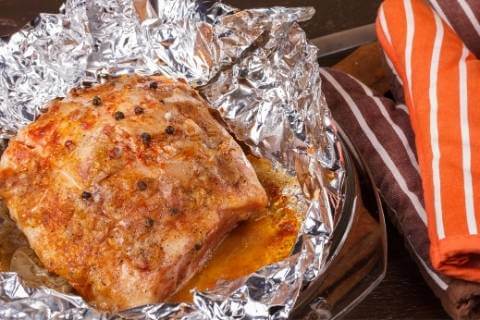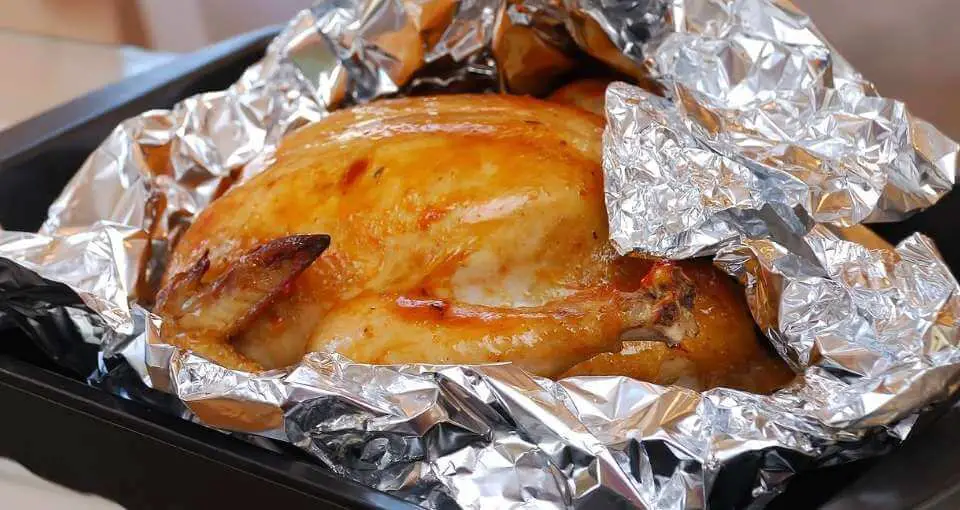We’ve all been there at some point; you’re about to put a beautiful piece of meat into the oven, and then the thought crosses your mind: should I cover it or leave it uncovered to make it cook the fastest? I’ve been in this frustrating situation more times than I can count, so I finally sat down and did some research to figure out which one is the best option.
Covering meat when you cook it in the oven will trap the moisture and heat under the lid and often result in the meat cooking faster and being more tender. Leaving meat uncovered in the oven will usually require it to cook longer and leave the meat less moist but with a nice crispy outside.
It’s always nice to know how you might cook meat faster by merely covering it with some foil or a lid, but there is a little more to it. Below I’m going to go over some of the nuances to when and why you might want to cover, or not cover, your meat the next time you cook.
If You Want Your Meat to Cook Faster, Should You Cover It in the Oven or Not?
In general, if you are going for pure speed when cooking a cut of meat, covering it will usually be your best bet. However, like most things, there are many exceptions and nuances to this that are very important to take into account.
It all comes down to the recipe, how you want the meat to turn out, and what type of meat you are cooking.
When you cover the meat while cooking it in the oven, all of the juices, moisture, and heat are trapped. By covering the meat, it, in a way, steams it a little bit and keeps the moisture inside.
The trapped heat also makes it cook a little bit faster than if there was no covering over the meat.
Some cuts of meat would turn into complete mush if you cooked them while covered, and others are delightfully juicy when done this way.
You have to think about what you want the final result to look like before deciding whether or not to cover the meat when you put it in the oven.
You should cook tender cuts of meat such as tenderloin, ribs, and sirloin while uncovered because if you trapped a bunch of moisture and heat with them, they would become too mushy and would not cook properly.
On the other hand, you can cook tougher cuts of meat like brisket and chuck wonderfully while covered because the trapped moisture and juices can soften them up and make the meat more tender.
So, while covering meat generally makes it done faster because of the trapped heat under the covering, there are many situations where it is not worth the saved time because covering it would make it too mushy or cooked improperly.
How Much Faster Does Meat Cook When Covered Vs. Uncovered
There is no definitive answer to this because all meat cooks at slightly different rates, regardless of wither it is covered in the oven or not.
While it’s true that meat will generally cook faster when covered, it is usually faster by only a few minutes for meat that you cook for under an hour.
For meat that takes longer to cook, such as turkeys and large cuts of ham, the saved time could be more significant.
But, in the end, the main reason for covering certain meats when you cook them in the oven isn’t just to save time. It’s more about the final texture of the meat as well as how well prepared it is.

How to Know When to Cover or Uncover Meat in the Oven
Now that we have gone over whether or not covering meat in the oven is a good idea, it’s time to figure out how you can know whether to cover a particular cut of meat or not.
While it might save you a bit of cooking time in the oven if you cover all meat whenever you cook, sometimes it is best not to do it and instead spend a little more time to produce a far better and more delicious dish.
There are three basic scenarios that you can run into when cooking meat in the oven in regards to covering it or not covering it.
- You don’t cover the meat at all when cooking it.
- You cover the meat for the entire cooking time.
- You cover the meat during the main portion of the cooking time but uncover it at the end.
There is no hard and fast rule for whether or not you should cover a particular cut of meat or not, so you should always consult a recipe until you gain enough experience to cook without one.
In the following sections, I’m going to go over these three scenarios in more detail so you can figure out what to do the next time you find yourself cooking some meat in the oven.
You Don’t Cover the Meat at All
When you don’t cover meat when you cook it, all of the food’s moisture can disperse throughout the entire oven. Uncovering certain meats can make them lose all of their moisture and become very dry if cooked this way.
Because of this, you should cook most tender meats uncovered. They don’t often become too dry even if a little bit of their moisture disperses in the oven.
Almost any tender meat is excellent to cook uncovered, but some of the most popular ones to cook in this way are tenderloins, sirloins, and ribs.
Another great benefit of cooking meat without a cover is the golden brown outside that it can get.
There is nothing between the meat and the oven’s heat source, so most meat will sear a bit and form a nice brown outer layer.
Overall, cooking meat uncovered is one of the more popular cooking methods, and you will likely use it quite often. In most cases, it is straightforward—you put the meat into the oven with some seasonings—yet it results in a beautifully cooked and delicious piece of meat with a lovely brown outer layer.
You Cover the Meat for the Entire Time
Covering meat for the entire time in the oven is a great way to make it cook faster and retain a lot of moisture, but it is also excellent at making the meat turn into mush and become too soggy.
There are only certain meats that you should cover when you cook, and they are usually more on the tougher side of things. Meat such as chicken breasts, brisket, chuck, and other less tender meats do well covered.
Some meats, such as fish, do well covered in the oven even though they aren’t necessarily considered tough meats.
For particularly tough meats, sometimes you can add broth or other liquids to make it more tender. When you cook meat covered in the oven with other fluids, it will create a very steamy environment under the cover.
Not only does it cook the meat faster because of the trapped heat, but it will also soften the meat considerably.
Before covering a cut of meat in the oven, make sure that it won’t get too soggy from any added liquid or just from the moisture of the meat. Some recipes rely on covering the meat to soften it up a lot, but in most cases, you want to make sure it doesn’t become too tender and soft.

You Cover the Meat But Remove the Cover at the End
The last option that we are going to talk about today is when you cover the meat for most of the cooking time, but right before it is complete, you remove the cover and let it continue to cook for the remaining time.
You can do this to cook the meat thoroughly while it is covered, but allow it to brown and sear slightly near the end of its cook time to get that nice brown outside to the meat.
Uncovering the meat near the end of its cooking time adds an extra layer of texture to the meat and makes the entire dish a little more delicious than it would have be
Covering and then uncovering meat is usually done with whole birds such as chicken, duck, and turkey, but can be done with other types of meat.
Covering and then uncovering the meat is sort of the best of both worlds. It allows the meat to cook thoroughly and steam a little under the cover from the moisture released from the flesh, but you still get the brown outside that you get from searing it without a cover at the end.
This cooking method doesn’t work very well if the meat becomes too mushy while still covered. You have to make sure the meat is sturdy enough not to become too soggy while covered and then is tender enough, so it doesn’t lose all of its moisture when cooked without a lid.

